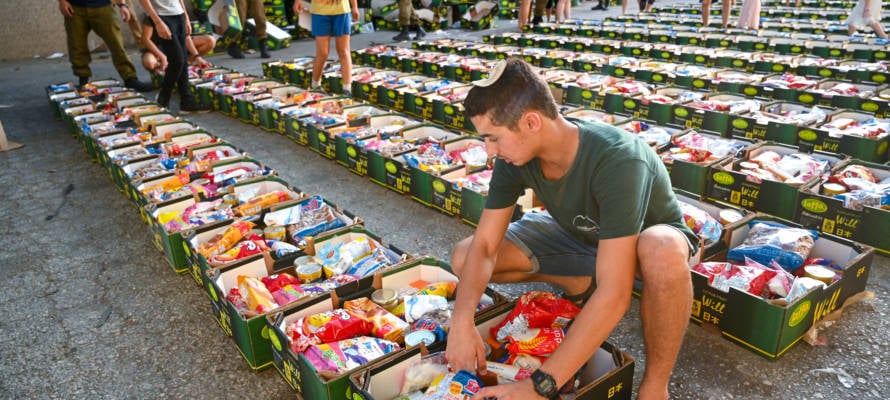The organization has donated thousands of supplies to soldiers.
By Debbie Weiss, The Algemeiner
Since the Hamas terror group’s Oct. 7 massacre, immigrants who moved to Israel (olim in Hebrew) have been helping the Jewish state’s war effort in crucial ways beyond the battlefield. The Algemeiner has spoken to several of these individuals — natives of the US, Europe, and elsewhere — gathering their stories of courage and resourcefulness to help Israel prevail over Hamas in Gaza. Over the coming weeks, The Algemeiner will share some of these stories as a new series on how olim are helping Israel’s war effort. To read part one, click here.
On Oct. 8, Raphael Danan, a British-Israeli resident of Jaffa, spoke to a close friend who was one of 300,000 reservists who had been called up a day earlier. The friend ended the call with what seemed like an inconsequential gripe in light of the profound horror that had just taken place. “We don’t have toothpaste or toothbrushes,” the Israel Defense Forces (IDF) soldier complained.
It prompted Danan to reach out to local WhatsApp groups and start a fundraising drive to procure basic supplies for the soldiers — items like socks and undershirts. The next day, Danan and another volunteer made their first supply run to a base. More than two months later, the volunteer-run group, called Friends in Jaffa (FiJ), is still going strong and, to date, has donated thousands of supplies to soldiers — anything from gloves to tactical gear like tourniquets.
Volunteers either procure the items for free or raise funds for a particular project. In some cases, the supplies themselves come from a particular Jewish community in the US. The Jewish community of Miami, for example, donated 500 military-grade rainsuits. But no less important than the suits were the notes to the soldiers written by children in the community. “The soldiers were so, so happy to receive them,” said Amelia Bagnoli, a FiJ volunteer originally from Canada.
Former Israeli Ambassador to the US Michael Oren lauded the group’s efforts, saying they were “crucial for our forces in the field.”
“[The soldiers] have great needs, needs for various types of equipment that haven’t been supplied by the IDF, and the Friends in Jaffa are working assiduously night and day to supply those needs,” Oren said.
Itai, a company commander stationed on Israel’s northern border, said FiJ had “entered my heart” because they were as efficient as they were compassionate. According to the 29-year-old, who asked that only his first name be used, the IDF has the resources to supply units with what they need, but the process is often laborious and entangled in bureaucracy.
FiJ, on the other hand, takes a comprehensive inventory of what’s needed and can “find a supplier within an hour and can even get [the items] to us within a day,” he said. “The army cannot compete. It can take a week or more.”
Another IDF soldier, Bar Peleg, also lauded the group for its accuracy in servicing the soldiers’ specific needs. “What we ask for is what we get. This is better than other civilian [groups] who have tried to do this but who don’t do this so well, despite their good intentions.”
Itai — who was a resident of Nachal Oz, one of the Gaza-envelope communities that was hit hard on Oct. 7 by Hamas terrorists — added that the supplies sourced by FiJ were of superior quality.
“The [IDF] gear is good enough but it’s not the best. I believe that my soldiers need to get the best and I’m not ashamed to say it,” he said.
Bagnoli explained that proper equipment had the ability to mitigate the “psychological stress” soldiers were under.
“If there’s any way of reducing their stress, even if it’s sleeping on a field bed instead [of the floor] or having dry socks — we were told by commanders that it reduces the chances of PTSD [post-traumatic stress disorder] later on,” she said.
Danan praised the volunteers’ “incredible fortitude.”
“There is so much determination by the volunteers in doing these missions, but it’s a two-way street. The soldiers’ appreciation creates a really special bond and is more than enough of a reward for us,” he said.
